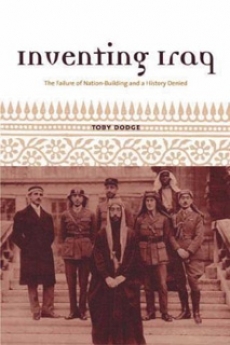
Inventing Iraq: The Failure of Nation Building and a History Denied
In Iraq today, the United States is presiding over a country about which it has a limited understanding. The United States is attempting to rebuild Iraqi state institutions and reform their interaction with society. Post–Cold War military interventions into failed or rogue states with the overt aim of reforming their political systems are becoming increasingly common but, to date, these interventions have been uniformly unsuccessful. It is not surprising therefore, that attention is increasingly being focused on Britain’s own inadequate attempts to build a modern democratic state in Iraq during the eighteen-year period between 1914 and 1932.
At the beginning of a very hot Iraqi summer I interviewed a senior British diplomat in the garden of what had been the British High Commission on the banks of the Tigris River in Baghdad. He was optimistic, even bullish. The lawlessness that had been the focus of much media coverage over the previous month was, he said, overstated. Order would soon return to the capital’s streets and the country beyond. Criticism, both Iraqi and international, of the nascent representative structures being fostered by the occupying powers was inaccurate. They were not, as detractors argued, dominated by an irrelevant minority of carpetbaggers, but were instead the foundations of a democratic process that would slowly evolve into a vibrant and sustainable polyarchy—a stable coordinated rule of multiple institutions representing diverse social forces and interests...
contents
Preface / ix
1. Understanding the Mandate in Iraq / 1
2. The Mandate System, the End of Imperialism, and the Birth of the Iraqi State / 5
3. Corruption, Fragmentation, and Despotism: British Visions of Ottoman Iraq / 43
4. Rural and Urban: The Divided Social Imagination of Late Colonialism / 63
5. Using the Shaikhs: The Rational Imposition of a Romantic Figure / 83
6. The Social Meaning of Land: State, Shaikh, and Peasant / 101
7. The Imposition of Order: Social Perception and the “Despotic” Power of Airplanes / 131
Conclusion: Iraq’s Past And Possible Iraqi Futures / 157
Notes / 173
Bibliography / 227
Acknowledgments / 247
Index / 251
Preface: Iraq and the Ordering of Postcolonial World
from Woodrow Wilson to George W. Bush
In Iraq today, the United States is presiding over a country about which it has a limited understanding. The United States is attempting to rebuild Iraqi state institutions and reform their interaction with society. Post–Cold War military interventions into failed or rogue states with the overt aim of reforming their political systems are becoming increasingly common but, to date, these interventions have been uniformly unsuccessful. It is not surprising therefore, that attention is increasingly being focused on Britain’s own inadequate attempts to build a modern democratic state in Iraq during the eighteen-year period between 1914 and 1932.
At the beginning of a very hot Iraqi summer I interviewed a senior British diplomat in the garden of what had been the British High Commission on the banks of the Tigris River in Baghdad. He was optimistic, even bullish. The lawlessness that had been the focus of much media coverage over the previous month was, he said, overstated. Order would soon return to the capital’s streets and the country beyond. Criticism, both Iraqi and international, of the nascent representative structures being fostered by the occupying powers was inaccurate. They were not, as detractors argued, dominated by an irrelevant minority of carpetbaggers, but were instead the foundations of a democratic process that would slowly evolve into a vibrant and sustainable polyarchy—a stable coordinated rule of multiple institutions representing diverse social forces and interests.
The interview took place at the end of May 2003 as British and American forces, having unseated Saddam Hussein, struggled to impose order on Iraq and wondered how to reform its political structures. However, the conversation could well have taken place at the end of May 1920. Instead of Christopher Segar, Head of the British Office in Baghdad, answering the questions, it would, in 1920, have been Arnold Wilson, the acting Civil Commissioner, responsible for building a state in Iraq in the aftermath of the First World War. Wilson was a confident and bullish colonial official who was wrestling with a serious dilemma. How, under intense international scrutiny, could he control a well-armed society that had become increasingly resentful about the occupation of their country? Wilson himself never found satisfactory answers to this question. On July 2, 1920, a revolt, or thawra, broke out along the lower Euphrates. Fueled by a population resentful at the heavy-handed approach of the occupying forces, the rebellion quickly spread across the south and center of the country. Faced with as many as 131,000 armed opponents, the British army did not regain full control until six months later in February 1921. The cost in lives and money of the revolt made the continued occupation of Iraq very unpopular with British public opinion. It also cost Wilson his job. From 1921 onward the British continually strove to cut the costs of their presence in Iraq. Ultimately the decision was made to extricate themselves from the country as quickly as possible. The result was a failure to build a liberal or even a stable state in Iraq....
Inventing Iraq
The Failure of Nation Building and a History Denied
Toby Dodge
Columbia University Press
Publishers Since 1893
New York Chichester, West Sussex
Copyright © 2003 Columbia University Press
All rights reserved
Library of Congress Cataloging-in-Publication Data
Dodge, Toby.
Inventing Iraq : the failure of nation-building and
a history denied / by Toby Dodge.
p. cm.
Includes bibliographical references (p. ) and index.
isbn 0-231-13166-6 (cloth : alk. paper)
1. Iraq—Relations—Great Britain.
2. Great Britain—Relations—Iraq.
3. National state. 4. Sovereignty.
5. United States—Politics and government—2001–
6. Iraq War, 2003. I. Title
DS70.96.G7D633 2003
956.704'1-dc21 2003051453
Columbia University Press books are printed on
permanent and durable acid-free paper.
Printed in the United States of America
c 10 9 8 7 6 5 4 3 2 1